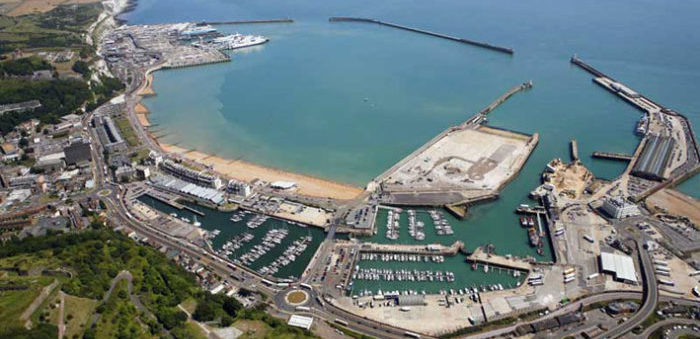Doug Bannister, the Chief Executive Officer of the Port of Dover stated that the port, through which a sixth of the U.K.’s trade in products is being transferred, will be able to deal with any disturbance experienced by a no-deal Brexit, accounting for predictions of chaos.
In fact, Bannister quoted to Bloomberg that “The Port of Dover is 100% ready, Ferry operators: 100% ready, Calais, Dunkirk: 100% ready”.
Yet, in light of the no-deal Brexit and its unknown effects, he further commented that “Once the rules of the game are known business will adapt, and they will adapt very, very swiftly”.
[smlsubform prepend=”GET THE SAFETY4SEA IN YOUR INBOX!” showname=false emailtxt=”” emailholder=”Enter your email address” showsubmit=true submittxt=”Submit” jsthanks=false thankyou=”Thank you for subscribing to our mailing list”]
Also, France is conducting customs controls in Calais, something that may lead to disruptions in Port of Dover, as trucks with their UK export papers may not have access to their French import papers after Brexit. Meaning that although Calais is able to host 300 trucks with incorrect papers in its holding area, when that area is full, it will prevent freights from entering, having negative impact in Dover’s operations.
Overall, France’s operations can easily affect the British shipping industry; Thus, the UK authorities agreed to make customs procedures simpler the first six months after Brexit, waiting to see how the French authorities will cope with the changes in Calais.
In addition, Charlie Elphicke, Dover’s Member of Parliament, highlighted the importance of the Brexit’s deadline – October 31 – , acknowledging that “no one knows what disruption there might be on the French side”, highlighting that any delays would have severe impact to both the British and Europeans.
The port of Dover processes 12 ferry-loads and 10,000 trucks per day, handling 120 billion pounds ($150 billion) of trade annually. Remarkably, if two minutes would be added to the time it takes to process one truck, 17-mile traffic would be created.
According to Bannister, the government is developing five sites, which will be ready by 31 October, across southeastern England and away from the port itself, where freight trucks will make export declarations prior to departing to Dover; The new sites should funnel only those with the appropriate paperwork needed.
The Yellowhammer paper, which was leaked to The Sunday Times, presented the worst-case scenario and estimated that up to 85% of cargo trucks bound for France at the Channel Straits would not be ready for French customs, leading to tailbacks and delays of 40-60% within one day. Following the Yellohammer report, Bannister added that a disruption is expected, and no one can predict how long it will last.
In late February, Drewry published a study according to which port of Dover will be able to handle the Brexit.
In light of Brexit, a new report was published, discussing 36 detailed recommendations to grow the UK’s $6bn – marine insurance, ship broking, legal, finance and classification industries. The report is in line with UK’s 2050 Maritime strategy, that aims to enhance UK’s strength on maritime innovation focusing mostly on autonomy and low-carbon technologies.




























































